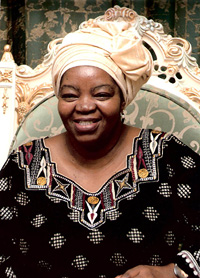Sheila Tlou, former Minister of Health in Botswana, took over as UNAIDS director for East and southern Africa in November, just a month before the deadline for achieving universal access to treatment, prevention, care and support expires.
With only two countries in the region having met the target for treatment, Tlou talked to IRIN/PlusNews about the value of setting goals and what countries should aim for next.
QUESTION: How do you think the targets have contributed to the AIDS response, in light of the fact that many countries have not met them?

ANSWER: Universal access to me means access not just to treatment but prevention, care and support. And from the report, we’ve seen that a lot of countries have moved towards universal access. In the ones that have reached it – Botswana and Rwanda – it’s really contributed in that we’ve seen deaths from HIV go down… you’ve seen quite a lot of reductions even in countries that may not reach it and once people are on treatment their infectivity goes down so it contributes even to the prevention side.
So it’s come up with a good momentum in terms of looking at all the indicators such as child mortality, maternal mortality, including even the overall economy of countries, as more and more people are not absent from work – we’re finding that productivity increases thanks to universal access.
Q: Do you think having the targets is useful in terms of galvanizing a response?
A: People need targets. This is where you really get to see that we are a global community… especially when you review them occasionally because then you create competition between countries. With “3 by 5” [UNAIDS initiative to provide three million people living with HIV in low- and middle-income countries with antiretroviral treatment by the end of 2005] for example, all countries knew how many at a minimum they should put on ARVs (antiretroviral drugs) and a lot of countries reached that, especially in southern Africa. So we need targets.
Q: Were the targets realistic?
A: To me they were a little bit too high, but I feel they were realistic in the sense that we always say, ‘Aim for the sky and you’ll reach somewhere’. Had countries been given targets that were just mid-way, chances are they would actually by now only have realized half of that. As long as we don’t have sanctions for countries that don’t meet the targets; the main thing is to encourage, to say ‘We can make it’.
| Chances are, once we get to 2015, we’ll set some more targets and I have a feeling those targets will not be as harsh as the ones we’re having because, let’s face it, the world was suffering [when the targets were set in 2005], ARVs were very expensive, so we needed that impetus.
Q: As far as you are concerned, the next set of goals to focus on would be the Millennium Development Goals (MDGs)? Q: Is this vision of zero new infections new? Q: Besides money, what do you think are the greatest barriers to achieving universal access? You are now seeing that because these populations are excluded, if you criminalize them, they will go underground and… even before you talk about human rights it means you’ll never achieve zero infections because we have a group that’s not accessing services. Of course, when you look at human rights, these people have the same rights to access HIV prevention, care and support services as the other populations. So I think in the next two years, those are the issues that we’ll be grappling with. We’re seeing that certain countries are putting them in jail, it doesn’t help at all; some countries have gone backwards. But fortunately it’s not all African countries. We have South Africa that recognizes men who have sex with men, and Rwanda. Little by little we’ll get there. PlusNews ks/mw |
|
| Theme(s): (PLUSNEWS) Care/Treatment – PlusNews, (PLUSNEWS) HIV/AIDS (PlusNews), (PLUSNEWS) Prevention – PlusNews, (PLUSNEWS) Stigma/Human Rights/Law – PlusNews | |
| [This report does not necessarily reflect the views of the United Nations] | |
